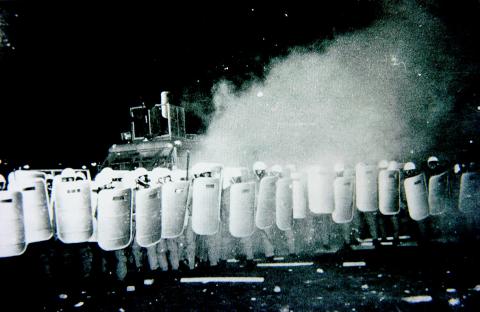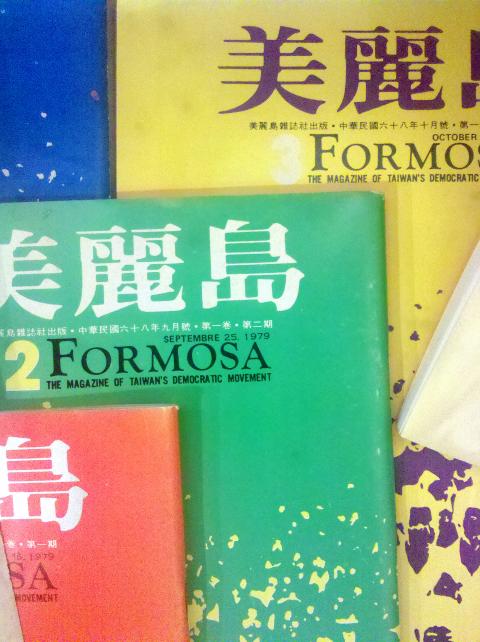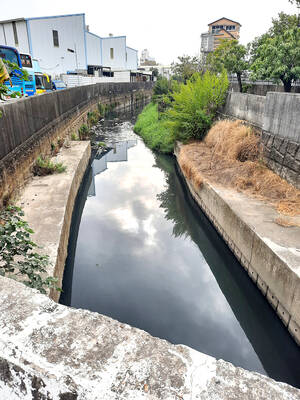Taiwan in Time: Dec. 7 to Dec. 13
The night of Dec. 12, 1979 was a restless one for the staff of Formosa Magazine (美麗島雜誌), as they gathered in a building in Taipei where several of them lived.

Photo: Chu Pei-hsiung, Taipei Times
Almost all of them would go on to become major Democratic Progressive Party (DPP) political players in the future, but for now, they were wanted criminals.
Two days previously, on Human Rights Day, the magazine, published by dangwai (黨外, “outside the party”) politicians opposing the Chinese Nationalist Party’s (KMT) one-party rule, organized a pro-democracy rally in Kaohsiung. The KMT sent troops and police to surround and intimidate the protesters, and things soon turned violent. Official injury numbers initially showed 183 officers and no civilians, the latter figure later increased to 50.
Accounts of what actually happened changed over time, with perceptions today being more sympathetic to the dangwai than what was indicated in the KMT-controlled media.

Courtesy of Wikimedia Commons
Today’s popular version of events is that the police repeatedly closed in on the protesters and used tear gas, which caused them to retaliate despite calls for calm by protest leaders. This came to be known as the Kaohsiung Incident, also called the Formosa Incident.
The next day, the National Security Bureau and Taiwan Garrison Command announced that they would arrest those who were responsible for the incident — namely the dangwai politicians.
In an oral history of the incident published by Academia Sinica, former vice president and Formosa Magazine editor Annette Lu (呂秀蓮) says for safety concerns she and current Kaohsiung mayor Chen Chu (陳菊) were staying with fellow magazine staff Lin Yi-hsiung (林義雄), Shih Ming-te (施明德) and Linda Gail Arrigo.
Lu says she fell asleep while Arrigo kept contact with the outside through telephone. When the phone line was cut, Arrigo knew something was wrong and barricaded the doors with furniture.
Lu remembers Chen jumping off the second floor balcony, distracting the officer pursuing Shih, who eventually got away. The rest of them were arrested. Arrigo was deported, while the others, along with four other opposition leaders were accused of sedition, tried by a military court and sentenced to terms ranging from 12 years to life imprisonment.
THEN AND NOW
Today, the incident is regarded as a crucial moment in Taiwan’s democratization. Though it would be another eight years until opposition parties were officially allowed, this event is often considered a sign of the KMT’s weakening grip on sole power of the country.
But back then, most media outlets portrayed the rally organizers as riot inciters who had planned the violence and were serious threats to a stable, “democratic” society.
Consider this passage from the 1980 book The Complete Story of the Formosa Incident (美麗島事件始末): “This is a very satirical tragedy in the history of Taiwanese democracy, as the violence was perpetrated by people who have been calling loudly for democracy.”
Almost each newspaper printed letters from “patriotic” readers denouncing the dangwai’s actions, as well as interviews with local officials, wounded officers, celebrities and so on. Most accounts also state that the officers didn’t fight back when attacked and praised their noble actions.
One article features an officer who lost several teeth in the incident. He reportedly refused the consolation money offered by the government.
Unable to speak, he wrote on a piece of paper, “What’s the use of giving me money? I just want our country to survive … I hope the government will stop tolerating these inhumane conspirators.”
Nothing could be more symbolic than the sailor who stood in the face of the protesters with his hands held high, tears on his face, singing loudly the patriotic song Plum Blossom (梅花), even continuing when he was attacked.
“I am Chinese, I love my country,” he reportedly yelled.
Of course, each side has their own story to tell, but the various commentaries calling the incident an attack on a “free and democratic” country is deeply ironic, as martial law was still in effect, and it was in fact the lack of democracy that led to the founding of the magazine.
Although opposition parties were still banned, the KMT appeared to become more lenient as it allowed dangwai politicians to run for the National Assembly in 1969. They were gearing up for the 1978 legislative elections when the US severed relations with Taiwan. In response, the KMT suspended all electoral activities and announced that emergency measures would be taken against those who gathered illegally or held demonstrations.
Their only means of entering politics cut off, the dangwai turned to political activism. Formosa was formed as the voice of the dangwai, and celebrated its first issue with a banquet at the Mandarina Crown Hotel while it was surrounded by taunting protesters led by members of a pro-KMT magazine. It was a rocky start, and it took a long time before things got easier.
Taiwan in Time, a column about Taiwan’s history that is published every Sunday, spotlights important or interesting events around the nation that have anniversaries this week.

The People’s Republic of China (PRC) invaded Vietnam in 1979, following a year of increasingly tense relations between the two states. Beijing viewed Vietnam’s close relations with Soviet Russia as a threat. One of the pretexts it used was the alleged mistreatment of the ethnic Chinese in Vietnam. Tension between the ethnic Chinese and governments in Vietnam had been ongoing for decades. The French used to play off the Vietnamese against the Chinese as a divide-and-rule strategy. The Saigon government in 1956 compelled all Vietnam-born Chinese to adopt Vietnamese citizenship. It also banned them from 11 trades they had previously

Jan. 12 to Jan. 18 At the start of an Indigenous heritage tour of Beitou District (北投) in Taipei, I was handed a sheet of paper titled Ritual Song for the Various Peoples of Tamsui (淡水各社祭祀歌). The lyrics were in Chinese with no literal meaning, accompanied by romanized pronunciation that sounded closer to Hoklo (commonly known as Taiwanese) than any Indigenous language. The translation explained that the song offered food and drink to one’s ancestors and wished for a bountiful harvest and deer hunting season. The program moved through sites related to the Ketagalan, a collective term for the

As devices from toys to cars get smarter, gadget makers are grappling with a shortage of memory needed for them to work. Dwindling supplies and soaring costs of Dynamic Random Access Memory (DRAM) that provides space for computers, smartphones and game consoles to run applications or multitask was a hot topic behind the scenes at the annual gadget extravaganza in Las Vegas. Once cheap and plentiful, DRAM — along with memory chips to simply store data — are in short supply because of the demand spikes from AI in everything from data centers to wearable devices. Samsung Electronics last week put out word

The central government sets the nation’s environmental strategy and directs the push for net zero. It proposes laws and decides how most tax dollars are spent. The country’s local governments aren’t powerless, however. They draft local ordinances, assign manpower to carry out inspections, and — a recently-published assessment of environmental governance at the city/county level makes clear — have their own priorities. On Dec. 24, the Taiwan Environmental Protection Union (TEPU, 台灣環境保護聯盟) released its latest Municipal and County Government Sustainable Governance Evaluation Report. After analyzing 99 metrics, the NGO declared that the environment-related policies and implementation of Kaohsiung City, Tainan City